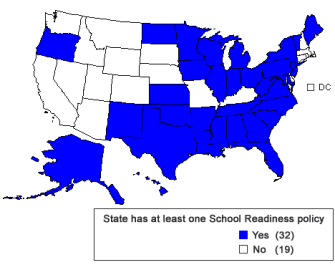In the U.S., children typically start their formal education around the age of five. With increased attention to the performance of even the youngest students, many states are enacting policies to ensure students arrive at school prepared to succeed on day one. In Quality Counts 2008, the EPE Research Center found that 32 states have enacted at least one of the three main school-readiness policies tracked in the report. Twenty-one states have interventions and/or supports in place for children judged not school-ready. In 17 states, local school districts are required to conduct some sort of school-readiness assessment to determine if children are prepared for the work they will encounter at school. But only 13 states have established formal definitions of school readiness that address what a child should know and be able to do in order to succeed in the K-12 system.
For more state-by-state data on school readiness or other issues, search the EPE Research Center’s Education Counts database.
State Policies Ensuring School Readiness
SOURCE: EPE Research Center, 2008.



